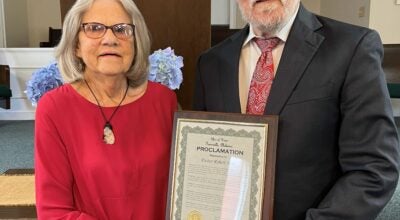‘Moral turpitude’ confusing matter for registrars, voters
Published 7:59 pm Tuesday, October 14, 2008
With a presidential election right around the corner and a number of state offices up for grabs, voter registration is at record levels in Alabama.
But who deserves the privilege of voting and who doesn’t?
And who decides?
That’s a problem faced by county voter registrars: Deciding exactly which ex-felons are eligible to sign up and which are not.
It all boils down to a certain 2003 Alabama law barring felons who have committed acts of “moral turpitude.”
According to the Law.com Dictionary, moral turpitude is defined as a “gross violation of standards of moral conduct, vileness. An act involving moral turpitude is considered intentionally evil, making the act a crime. The existence of moral turpitude can bring a more severe criminal charge or penalty for a criminal defendant.”
“That is a pretty subjective term, and that’s the problem,” says Steve Norman, Butler County’s probate judge. “What I would define as intentionally evil, someone else may not. I think the Legislature meant to be cautious when they made this law. What is left, however, is a great big gray area Republicans and Democrats are fighting over. The Republicans seem to want to keep everybody out, and the Democrats want everybody in there to vote.”
Further confusion is caused, Norman said, by the fact the state has different lists of felons considered to be guilty of moral turpitude.
“The Governor’s Office has a list, but so does the attorney general and the State Administrative Office of Courts. And none of the lists match. And all claim they have the official one,” Norman said.
Last Friday, Montgomery Circuit Judge Tracy McCooey dismissed a lawsuit filed by the ACLU for three plaintiffs, all ex-felons claiming voter disenfranchisement. In a hearing last Wednesday, McCooey said she was troubled by the fact the ACLU’s three plaintiffs filed suit before actually filling out voter registration forms and being officially registered by county voter registrars.
Two of the individuals had not tried to register. The third had attempted to register, but not before exhausting possible appeals in probate court before going to the circuit court.
Because of this, “This court lacks jurisdiction to even decide the merits of the case,” McCooey wrote in her decision.
With only three weeks left in the Legislative session and an Oct. 24 deadline for new voters to register, Norman says resolution of the matter before the Nov. 4 election is “very unlikely to happen.”
“And then it’s not going to be an issue for another four years. It won’t be resolved until the Legislature stands up and really defines what moral turpitude is, and is not,” Norman said.
According to the secretary of state’s office, 9,692 people were removed from the state’s voter rolls between Sept. 17, 2007 and Oct. 3, 2008 because of felony convictions. Secretary of State Beth Chapman took over the database in September and began advising county voter registrars to consult the shorter list of the attorney general and to seek the advice of their county attorney, district attorney or her office’s attorney if they needed additional assistance.





